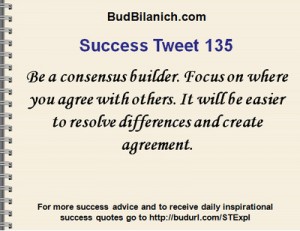 The July 2009 issue of SUCCESS Magazine had an interesting interview with Patrick Lencioni, author of, The Five Dysfunctions of a Team. I’m an admirer of Patrick’s writing. I particularly like what he has to say about teams and teamwork. Fear of conflict is one of the team dysfunctions he discusses in the book and interview in SUCCESS.
The July 2009 issue of SUCCESS Magazine had an interesting interview with Patrick Lencioni, author of, The Five Dysfunctions of a Team. I’m an admirer of Patrick’s writing. I particularly like what he has to say about teams and teamwork. Fear of conflict is one of the team dysfunctions he discusses in the book and interview in SUCCESS.
And, if you read this blog with any regularity, you know that I am a big fan of SUCCESS Magazine. I read it cover-to-cover every month and usually blog about one or two of the articles in each issue. If you’re not a subscriber, I suggest you go to www.success.com and do so now.
Here’s what Patrick Lencioni has to say about conflict and disagreement…
“The fact is that great teams argue. Not in a mean-spirited or personal way. But they disagree, and passionately, when important decisions are made. They argue about concepts and ideas and avoid personality focused, mean-spirited attacks. So many of us have been raised to avoid conflict and disagreement that we try to compromise and reach artificial consensus, and that only leads to mediocrity.”
Successful, interpersonally competent people are not mean-spirited. They don’t attack others. They do, however, voice their disagreement with another’s ideas in a positive manner. They use conflict to find better, more creative solutions to their differences with others.
I always encourage people who are in conflict to do something that is counter intuitive – focus on where you agree, not where you disagree. When you find yourself in conflict with another person, it is natural to focus on your differences. However, this approach tends to lead to digging in your heels and looking for support for your position. The more you do this, the less open you are to hearing what the other person has to say. Conflict resolution becomes a zero sum, win/lose game.
On the other hand, if you actively look for and find places where you agree, you can jointly create a solution that satisfies both of your needs. Here is an example.
When we bought our house, we had a conflict with the seller over the closing date. This was happening at the end of the year. The seller, who was also the builder, wanted to close by December 31. We were not planning on moving until February 1. Due to some ambiguous language in the contract, the situation was becoming quite contentious.
Finally, I said to the builder, “John, you want to sell this house. We want to buy it. I’m sure we can work out a closing date that suits us both.” At that point, the tone of our discussions changed. We were working together to solve a problem – not arguing over December 31 and February 1 dates. Even though we both ended up giving a little, neither of us felt that we had given up on our position. We were able to resolve our conflict positively.
The common sense career success coach point here is simple. Successful people are interpersonally competent. Interpersonally competent people resolve conflict positively, with little damage to their relationships. They follow the career advice in Tweet 135 in Success Tweets. “Be a consensus builder. Focus on where you agree with others. It will be easier to resolve differences and create agreement.” Conflict can be destructive to relationships and it can kill your career success. But when you work to resolve conflict positively, you strengthen your relationships. Strong relationships make it easier for you to resolve future conflicts and build your career success. Focusing on points of agreement, however small, is the best way to resolve conflict positively. Focusing on where you agree puts you in a position to jointly create a mutually satisfying solution to a conflict, as opposed to win/lose negotiation, in which one person wins and the other loses.

Speak Your Mind